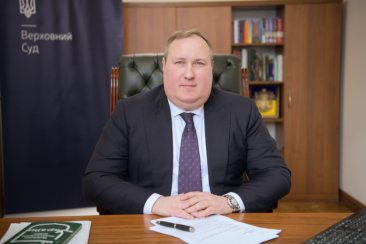Contact center of the Ukrainian Judiciary 044 207-35-46

Judge of the Civil Cassation Court within the Supreme Court Serhii Burlakov put emphasis on this fact while his speech on the 13th session of the Working Group on the Access to Justice under the Aarhus Convention of the UN Economic Commission for Europe, which took place on 15-16 February 2021. Hanna Vronska, judge of the Commercial Cassation Court within the Supreme Court, also participated in this event.
Serhii Burlakov told about the case-law of the Supreme Court as for ensuring citizens’ access to justice in disputes on the protection of environmental rights. The speaker informed that since his last year's report on this topic, the results of the judiciary in Ukraine in 2019 had remained a positive trend, and Ukrainian courts last year had provided citizens and environmental organizations with the possibility to protect environmental rights under Art. 9 of the Convention on Access to Information, Public Participation in Decision-Making and Access to Justice in Environmental Matters (Aarhus Convention).
Among the problems, Ukrainian courts faced with during the consideration of relevant cases, Serhii Burlakov mentioned the low level of legal education of citizens in the context of the possibility of public appeals in court against violations of environmental legislation and applications for the protection of environmental interests, as well as ambiguous application of the Aarhus Convention by courts regarding the right of citizens and non-governmental organizations to apply to court.
At the same time, the speaker drew attention to the Resolution of the Supreme Court of 2 October 2019 in the case No. 826/9432/17, concluding that a limited interpretation of the current legislation of Ukraine, of which the Aarhus Convention is a part, regarding the right to apply to court to protect the legally protected interest in ensuring environmental safety was inadmissible. The Supreme Court also pointed out that the right to protection of the violated constitutional right to a safe environment belonged to everyone and could be exercised by citizens both personally and jointly – through associations of citizens. “In this resolution, the Supreme Court finally ruled that the right of a citizen or public organization to defend in court its constitutional right to a safe environment may not be restricted in any way”, – Serhii Burlakov noted.
He also mentioned the Resolution of the Supreme Court of 1 October 2020 in the case No. 904/4470/19, which resolved the conflict between the protection of the right to peaceful enjoyment of one's possessions, on the one hand, and the right to safe environment, on the other.
In this case, a Farm leased land, a smaller part of which was attributed to the nature reserve fund. It plowed these lands, and an NGO filed a lawsuit seeking to terminate the lease in court.
The first instance court, upheld by the appeal court, had sustained the claim, but the Supreme Court cancelled the judgment. It pointed out that in this case it was not seen that the consequences of the violation committed by the defendant (plowing a part of the leased land plot for nature-oriented protection – protected shoreline belt and haymaking plot) could not be eliminated in other ways and manners provided for by the above legislation, in other words not otherwise than by sustaining the claim. It should be noted, herewith, that sustaining the claim in the manner specified by the plaintiff will deprive the defendant of the right to use those lands, in respect of which there are no violations of the law. Therefore, sustaining the claim in this case will lead to non-compliance with the criteria of compatibility of the measure of interference with the right to peaceful possession of property, upset a fair balance between the interests of society associated with this interference and the interests of the person affected by such interference – the defendant; and this is incompatible with guarantees specified in Art. 1 of the First Protocol to the Convention.
Thus, the Court pointed out that, if a public organization requested to remedy the violation in another way and in another manner provided for by law, for example by stopping illegal activities, such measures could be effective in protecting the violated rights.
Serhii Burlakov noted that last year judgments in this category of cases were adopted by the Administrative Cassation Court, the Commercial Cassation Court and the Civil Cassation Court within the Supreme Court, some of which the speaker drew attention to in his presentation. These resolutions reaffirmed the right of citizens to apply to court freely to protect their environmental rights. "It can be stated that in Ukraine in fact there is no restriction of the right of environmental community to apply directly to court. Those few cases, when such a right had not been provided by the courts of lower instances in violation of Art. 6 of the Convention for the Protection of Human Rights and Fundamental Freedoms, were corrected by the Supreme Court”, – the speaker concluded.
Head of the Division for International and Legal Cooperation of the SC Staff Lina Hubar and officials of the Division ensured the preparation and participation of the SC judges in the event.
Follow the link, to see the share presentation of Hanna Vronska and Serhii Burlakov: